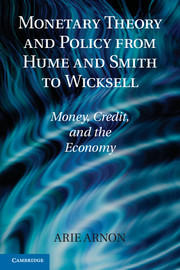Book contents
- Frontmatter
- Dedication
- Contents
- List of Illustrations
- List of Tables
- Preface
- Introduction
- Part one Analytical and Historical Foundations
- Part two Debating Monetary Theory under Inconvertibility
- Part three Debating
- Part four The Road to Defensive Central Banking
- 14 Bagehot and a New Conventional Wisdom
- 15 Does Karl Marx Fit In?
- 16 Marshall’s (Oral) Monetary Tradition and Bimetallism
- Part five A New Beginning
- Bibliography
- Author Index
- Subject Index
14 - Bagehot and a New Conventional Wisdom
Published online by Cambridge University Press: 05 July 2014
- Frontmatter
- Dedication
- Contents
- List of Illustrations
- List of Tables
- Preface
- Introduction
- Part one Analytical and Historical Foundations
- Part two Debating Monetary Theory under Inconvertibility
- Part three Debating
- Part four The Road to Defensive Central Banking
- 14 Bagehot and a New Conventional Wisdom
- 15 Does Karl Marx Fit In?
- 16 Marshall’s (Oral) Monetary Tradition and Bimetallism
- Part five A New Beginning
- Bibliography
- Author Index
- Subject Index
Summary
Introduction
The passing of the Bank Act in 1844 did not stabilize the financial system as the framers of the Act had expected; but in spite of this disappointing outcome – one that should have opened a new round of discussions – the next quarter century saw much less interest in monetary debates than had the 1840s. Two financial crises, one in 1847–1848 and the second ten years later in 1857–1858, resulted in two committees of inquiry that invited many witnesses to comment on the events of the crises; they in many ways merely repeated the formative debate held before the 1844 Act; their contribution was in adding new data sets collected especially for them. The two post-1844 crises forced those in control in the government and at the Bank to depart from the Act’s clear prescription to always follow a simple rule. In the first crisis, the announcement that the Bank’s Issue Department would issue more notes than the bullion it received – contrary to the Bank Act’s strict rule – was enough to calm the markets; the promised action didn’t have to be taken. In the second crisis, a similar announcement was not enough to return stability and had to be followed by action: The Issue Department actually injected notes into the circulation beyond the bullion reserve it had. This time the announcement was not enough, but the action that followed, apparently, calmed the markets. Thus, it was obvious to all observers that the Bank would not always follow the Bank Act, especially when it mattered most – in a crisis. The Banking School and others saw the two events and the new understanding about the Bank’s willingness to break the strict rule as confirmation of their views.
- Type
- Chapter
- Information
- Monetary Theory and Policy from Hume and Smith to WicksellMoney, Credit, and the Economy, pp. 277 - 308Publisher: Cambridge University PressPrint publication year: 2010



